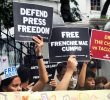DAVAO CITY, Philippines – Despite the city’s winning streak as the most child-friendly city, the ordinance promoting children’s welfare was “inefficiently implemented” and largely ignored.
This was the contention of Bernie Modragon, head of the Act for Children Alliance in a press conference Monday.
The Davao ACT for Children’s Rights and the Act for Children Alliance submitted their appeals to the Office of the City Mayor to push for the full implementation of the Children’s Welfare Code, particularly for the establishment of a Special Office for Children’s Concerns (SOCC).
In their plea, the alliance stated that the full implementation of the Davao City Children’s Welfare Code of 1994 as amended in 2006 is long overdue.
While certain provisions of the ordinance have been implemented as a response to certain incidents of abuse on children, the programmatic and systemic implementation of the regulation is still absent.
“We feel that the children in the city deserve more, and need protection and more comprehensive programs to address the roots of child abuse,” the plea further stated.
The Davao ACT for Children’s Rights, a federation composed of 28 barangay-based youth among three districts in the city echoes this appeal in their open letter to Mayor Sara Duterte-Carpio formulated through a joint children’s consultation.
In their letter, read by the federation president Jaziel Sinadjan, a list of recommendations were proposed.
This includes provisions regarding job opportunities for marginalized families, the promotion of responsible parenthood, strengthening the functionality of Barangay councils and offices concerned with child protection and of course, the creation of the SOCC.
Both institutions have been pushing for greater efforts to prioritize children-oriented concerns in the city and according to them this is the third series of appeals that they have forwarded to the Mayor’s attention.
In support of the demand to appropriate an office to address children’s concern, the Blue Heart Campaign under the Anti-Human Trafficking sector of the United Nations identifies the youth as the most vulnerable victims of human trafficking in the region.
Jeanette Ampog, Executive Director of Talikala Davao, reported during the same press conference that as of March 2018, 21 cases of human trafficking violations have been confirmed, 11 of which involved children aged 13 to 17.
About 17 of these occurred in Davao City and the victims are dominantly females.
Last year, a total of 96 cases were tallied and most victims belonged to the 7-12 and 18-35 age groups.
Ampog also pointed out that despite being classified under Tier 1 in terms of interventions against human trafficking, the Philippines is said to be the sixth most dangerous country for women to be exploited and sexually abused.
Thus, according to Ampog, they support the appeal for greater initiatives amongst Local Government Units (LGUs) to ensure that women and children are protected within their very homes since recent violators include relatives who sexually expose children and women via cyberspace and online sexual sites. (davaotoday.com)










